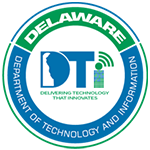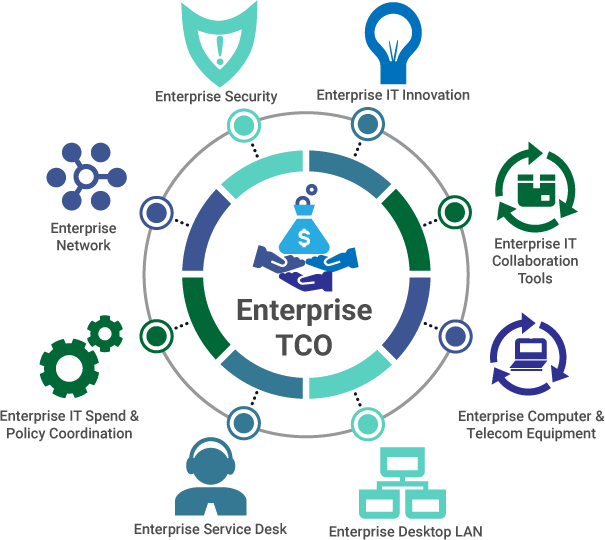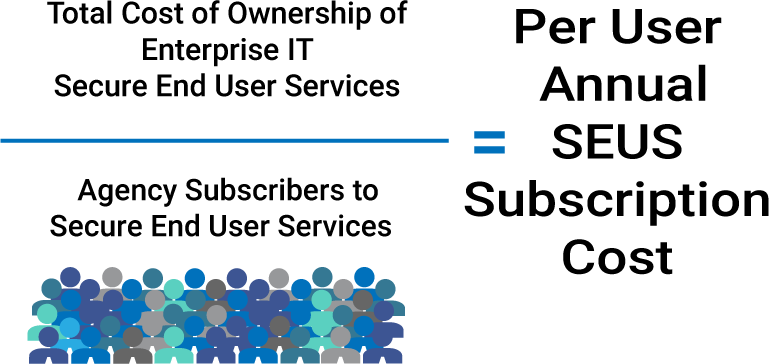 Delaware Department of
Delaware Department ofRealizing IT Centralization (ITC) requires a full and complete understanding of the State of Delaware’s Total Cost of Ownership (TCO) for technology services, assets, and resources.
Shared Services is a business model that enables technology resources to be leveraged across an entire organization resulting in shared costs with standard service levels. The Shared Service Cost Model is a method for determining the total cost to deliver a shared service across the enterprise. Using Service-Based Costing (SBC), an ITIL – Financial Management budgeting concept, all related costs and expenses are being allocated to the appropriate IT services and a unit cost is defined for each IT service based on consumption.
The DTI Shared Service Cost Model establishes an annual rate per user for Secure End User Services (SEUS). Because SEUS services are delivered across all agencies, the total cost of ownership is shared equally by all agencies.
A sustainable cost model is achieved when all necessary costs associated to the service provided can be fully recovered.
The Shared Service Cost Model is predicated on actual fixed, project, and consumed costs, as well as the costs to innovate and continue to right size IT services and tools for the state’s projected future needs.
The agency fiscal impact of Secure End User Services at centralization is calculated using the below equation. First, the agency user count for each service is confirmed to generate the annual cost of the SEUS package. Next, the agency’s current costs associated with delivering the in-scope services are subtracted from the annual costs. This includes reallocated staff salaries and current expenses paid to vendors and DTI. For example, tools, software, and hardware used for the agency service desk or desktop services.
| End User Package Annual Cost (# Users x Service Monthly Rate x 12) | $$ |
| – (subtract) Expenses of IT Positions Reallocated to DTI | ($$) |
| – (subtract) Expenses of EU Services/Tools Paid to Vendors Prior to ITC | ($$) |
| – (subtract) Expenses of EU Services/Tools Paid to DTI Prior to ITC | ($$) |
| Total Fiscal Year Net Impact | $$ |


(View the Cost Recovery Implementation)
Considering DTI has been working with OMB on the Shared Services Chargeback model, agencies are asking where the money to fund Collaboration/Security/Voice services is coming from and if agencies need to include this in their upcoming budget door openers.
Agencies do not need to request funding through the budget door openers process. Agencies should be prepared to discuss their consumption data at their target meeting with OMB.
Can you clarify how DTI will manage personnel funding for IT resources previously associated with providing service to a single agency?
When personnel from ITC agencies are reallocated to DTI and added to DTI’s Listing of Authorized Positions (LAP) report, their salary funding remains with the agencies. The agencies will only be responsible for paying for consumed SEUS services, not direct personnel costs.
My agency is concerned that DTI may be planning to charge for labor while continuing to receive funds through their regular payroll budget for the same service which would create the appearance of double dipping.
Effective FY25, DTI will not receive General Fund dollars for the personnel assigned to Security, Email and Collaboration, and Enterprise Voice Services. Instead, their salaries will be covered by service revenue collected from the agencies. It is important to note that each year, DTI is subject to Statewide Cost Allocation Plan (SWCAP) reporting. As a government agency, we cannot show a profit, and this is independently audited and verified through a third-party service provider. Overcharging or double dipping would put DTI in violation of federal regulations, which would be identified on the year-end audit report.
When is the best time to submit corrections regarding DDS reassignment for phones and Microsoft 365 agency counts? What’s the process for submitting those changes?
OMB has requested that these changes be made before the October budget submissions. We anticipate a significant number of change requests, so agencies should submit any licensing changes as soon as possible. The process to ensure changes are captured within DTI is to work with your Customer Engagement Specialist.
Is it possible to adjust or true-up Microsoft 365 licensing every month to account for employee turnover? We have considerable turnover at certain times of the year. It will be difficult to track long-term trends as IDs are removed from AD (Active Directory).
This is a frequently asked licensing question. Generally, agencies conduct a yearly true-up or reconciliation. The consumption data on the PPS contract will be determined by the actual consumption data from the previous 12 months. However, if agencies exceed this limit during the year, their monthly bill will be adjusted to reflect the increase in usage.
Will agencies be presented with another memo billing before FY25 to confirm everything?
DTI will generate consumption-level data reports as of mid-August to support agency OMB FY25 budget discussions. These data reports are based on updates received from agencies regarding the 5/1 memo billing process.
Based on the 5/1 memo bill, the Voice rate is $23.44, Collaboration is $35.68 and Security is $28.26 for FY25. Can agencies request supporting documentation to understand how the rates were determined?
This cost recovery model considers all the necessary factors needed to adequately provide the service. The model has been reviewed and approved by OMB in accordance with Delaware Code.
Can you tell me when the reports were pulled for this chargeback? I ask because my team has been working on cleaning up our phones and we see higher-than-expected numbers.
The process for generating the reports for Email and Collaboration, Security Suite, and Voice Services was completed in April and August 2023.
Both centralized and non-centralized agencies leverage DTI Enterprise Voice Services. Today, centralized agencies rely on the DTI EDL team to perform phone deployments and moves. Non-centralized Enterprise Voice agencies who do not receive DTI EDL service currently deploy and independently move their own phones. In FY25, when non-centralized agencies start paying for Voice Services, will DTI resources deploy/move phones for their agencies?
The Enterprise Voice Service package does not cover physical phone deployment or moves. These services are included in the Enterprise Desktop LAN (EDL) service. Agencies that do not receive Enterprise Desktop LAN (EDL) service will need to continue to deploy and move their phones as they do today.
Can you provide information on the differences in price and functionality between G1 and G3 Microsoft 365 licenses? Additionally, would you tell me by what date each year agencies need to switch their users to the more affordable G1 license to save on costs?
On the DTI website, you can find the Email and Collaboration service description that outlines the differences in functionality between G1 and G3 Microsoft 365 licenses. Regardless of which license an agency chooses, they will be charged $35.68 per license. Agencies who want to upgrade to G3 licenses should notify their Customer Engagement Specialist by September 15, 2023. G1 to G3 license upgrades will become available to the agency for use at the end of January 2024.
Will agencies be required to pay for a Microsoft 365 license for a disabled account?
If an account is disabled, it will still use a Microsoft 365 license and the agency will be charged for it as it is considered to be in use. It’s important for agencies to regularly check and confirm their account usage to prevent unnecessary charges.
Shared Cost Model FAQ updated on 8/24/2023